As Easter festivities took hold across Georgia, protesters in Tbilisi turned the holiday into another moment of collective action. Despite the celebrations, the heart of the capital remained charged with the echoes of ongoing protests, adding a layer of spiritual solidarity to their political struggle.
On April 20, 2025, thousands of protesters gathered in front of the Kashveti Church, directly opposite Georgia’s parliament, to celebrate the Orthodox Easter together. It was an unlikely intersection of religion and activism, as the faithful, alongside activists and families, lit candles, sang hymns, and participated in a holiday service to mark the occasion. The protesters, in a gesture of defiance and unity, used this solemn occasion to affirm their commitment to the ongoing protests that have gripped the city for months.
A Sacred Celebration in a Time of Protest
For the Georgian Orthodox community, Easter is a deeply significant religious holiday. Traditionally, the capital, Tbilisi, becomes quieter as families retreat to the countryside to enjoy the long weekend in the company of loved ones. However, this year’s Easter celebrations were unique. The streets around Rustaveli Avenue, usually full of holidaymakers, were instead crowded with protesters who found new meaning in celebrating Easter amid political unrest.

“The atmosphere is charged,” said one protester, standing next to the flickering candles at the edge of the crowd. “We’re here to pray for peace, justice, and for the future of our country. Easter isn’t just about the resurrection; it’s about rebirth. We need a rebirth of democracy in Georgia.”
The group gathered before the Kashveti Church, a symbolic site at the intersection of faith and power in Georgia, which had become the focal point for protests against the government’s increasingly authoritarian tendencies. The protesters’ choice of this site, opposite the parliament, was not accidental. The location symbolized their unyielding stance against the political elite and their resolve to continue pushing for reforms that would bring Georgia closer to its pro-European aspirations.
Despite the peaceful nature of the gathering, there was no mistaking the undercurrent of defiance. For many, the Easter service was as much about their faith as it was about their political struggle. The juxtaposition of religious reverence and political protest reflected the complexities of Georgian society, where faith and politics often intermingle in ways that are hard to separate.
Protesters Reaffirm Their Commitment to Change
Earlier in the evening, another crucial part of the celebration took place at the Heroes’ Memorial, a monument dedicated to Georgia’s fallen heroes. It was here that the families of political prisoners, activists, and supporters of the protest movement gathered to honor those who have been imprisoned for their political beliefs. It was a poignant moment, one that connected the current protest movement to last year’s anti-Foreign Agents law and post-2024 election rallies.
The memorial ceremony included the reading of an oath first sworn by young activists exactly one year ago. Zviad Tsetskhladze, one of the leaders of the previous year’s protests, read the oath aloud once more. Tsetskhladze, a student who had been a vocal critic of the government, remains in prison after his arrest during the December protests. His continued imprisonment has become a rallying cry for those still fighting against what they view as the government’s oppressive policies.
“Today, we remember Zviad and all those who are still behind bars for standing up for their beliefs,” said one protester, holding a photo of Tsetskhladze. “We are here to tell them we will not forget them. Their fight is our fight.”
The Political Context: A Year of Unrest
This Easter celebration, although steeped in religious tradition, was also a reflection of a year-long struggle. Since the passing of the controversial Foreign Agents law and the protests that followed the 2024 elections, the streets of Tbilisi have been filled with demonstrators calling for greater political freedoms and a more transparent, pro-European government. The political tension in Georgia has only deepened with the imprisonment of key activists, and the Easter protests are a clear sign that the discontent among the public is far from over.
The protesters’ commitment to their cause has not wavered. If anything, their resolve has only grown stronger. As they lit candles and prayed, their message was clear: they will continue their fight, no matter the season, no matter the holiday.
Georgia’s political landscape is in flux, and for many, the Easter celebrations represent a moment of reflection, both spiritual and political. The protesters see this as a moment of connection—between their faith, their families, and their ongoing struggle for a free and democratic Georgia.
Solidarity in the Streets
Throughout the evening, a sense of unity spread through the crowd. Protesters not only shared in their prayers but in their hope for a better future for Georgia. The gathering at Kashveti Church and the Heroes’ Memorial stood as a testament to the protesters’ unshaken commitment to their cause. They used Easter as a symbolic platform to rally others and reaffirm their mission.
Despite the underlying tension in the air, the Easter celebrations highlighted a rare sense of community in the face of adversity. The protesters knew that, whether at church, at the memorial, or in the streets, they were not alone. They stood together, unified by a vision for a future where democracy and justice prevailed.
